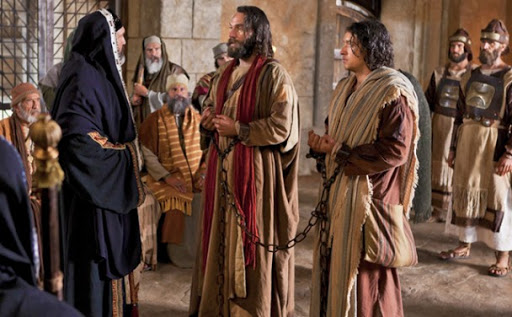Happy Easter everyone. “He is Risen….He is Risen Indeed!!”
On Good Friday, Elise and I watched Mel Gibson’s The Passion of the Christ. I had only seen it once before when it came out in 2005. The graphic nature of the film caused me to hesitate watching it again. But viewing it this time reminded me of what really struck me about the film when I first saw it. Prior to seeing the film, the story of Christ’s death was merely a story on a page. The film brought it to life so much that I had a much better visceral sense of what intense pain and humiliation Jesus suffered for us.

During Lent I also watched the series on YouTube called “The Chosen”. Here is a link to Episode 1 of 8 episodes. It is well worth watching. The series focuses on the early public ministry of Jesus and the calling of the apostles and Mary Magdalene. Peter, Andrew, John and James are especially highlighted, along with Mary. The series gives a view of the personalities of these disciples, particularly during the early stages of their relationships with each other and with The Lord.
In “The Chosen”, Peter is seen as a bit of an arrogant individual who takes it upon himself to solve the problems of his family and his friends. In doing so, he makes some very questionable decisions that leads him to the point of financial ruin. The miracle of Jesus having Peter casting his nets to bring in a huge catch after a night of failure results in Peter being saved from the brink of destruction. He then surrenders to Jesus admitting that he is a sinner. As we know, however, Peter continues doubting the Lord. In the series he is constantly debating with Jesus and questioning His choices on where they should journey to and what others should join in with their group. He especially argues against adding the tax collector, Matthew, as an apostle. And we know about his denying of Christ and trying to prevent Him from submitting to death at the hands of the Jewish leaders. In addition, he and the other apostles refuse to believe Mary and the disciples Jesus appeared to on the road to Emmaus when they insisted that they saw the risen Lord.
But then we come to Pentecost. Originally called the Festival of Weeks, it occurs 50 days after Passover. Some Jews countdown the days from Passover to Pentecost by what doing what is called the “Counting of the Omer”. But for Christians, Pentecost is when the Holy Spirit descended upon the apostles. It is 40 days after the resurrection and after Jesus ascended. And what we see in today’s reading from Acts is a VERY different Peter. Peter and John had just cured a cripple in public and the elders called them to appear before the Sanhedrin to be rebuked. However, we no longer see someone in hiding. Instead we see a man standing up to the Pharisees and declaring that it is impossible to not speak about what they had seen or heard. Peter goes on to lead the church and is martyred for his faith. He no longer fears death.
And that is what Jesus’ death was all about, wasn’t it. It was about the control death has had on mankind for millennia. Ever since Eve took that first bite in disobedience to God, generations to follow have had sin come between them and their relationship with God. Jesus’ death changed everything. How? Without death, there could be no resurrection and the resurrection of Jesus meant that we too could raise from the dead. And without His death, He could not have descended into hell as we recite in the Apostles creed. And without entering the netherworld he could not free the righteous souls who could only rely on ineffective animal sacrifice to atone for their sins.
But most importantly, Jesus won victory over death by freeing us from the fear of dying. Without the hope of the resurrection, death wins. It would dominate every decision we make. We would need to lie, cheat, steal, take advantage of one another, gossip and break just about every commandment in order to extend our time here on earth. But as followers of the resurrected Christ we know that our life here is but a blink of an eye compared to the eternity that waits for us. So the thought of dying for what is true has less of a sting. Death no longer dictates our choices or has the upper hand. This is what is meant that we are no longer slaves to sin. We can choose righteous behavior in spite of the potential consequences.
“Do not be afraid of those who kill the body but cannot kill the soul. Rather, be afraid of the One who can destroy both soul and body in hell” Matthew 10:28
St. Maximilian Kobe gave up his life at Auschwitz in place of a fellow prisoner. Saint Damien of Molokai cared for leprosy patients on the Hawaiian Island knowing it would lead to himself dying of the disease. Or José Luis Sánchez del Río who surrendered his life to the Mexican government in 1928 by refusing to denounce Christ. Countless martyrs died while refusing to deny the resurrection and their belief in the divinity of Christ. And, in the end, isn’t that the surest proof of the resurrection. That so many would willingly sacrifice their lives rather than turning their backs on what they knew to be true. And THAT is how death lost that day on a hill called Calvary.
